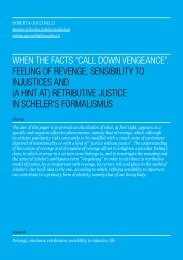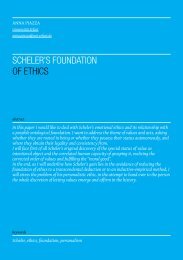the neosentimentalist argument against moral rationalism
the neosentimentalist argument against moral rationalism
the neosentimentalist argument against moral rationalism
You also want an ePaper? Increase the reach of your titles
YUMPU automatically turns print PDFs into web optimized ePapers that Google loves.
<strong>the</strong> neosentiMentalist aRGuMent aGainst MoRal RationalisM:<br />
soMe CRitiCal oBseRVations<br />
massimo reichlin università Vita-Salute San raffaele, milano<br />
examples of irrationality, psychopaths cannot constitute an objection to <strong>the</strong><br />
view that to accept a <strong>moral</strong> judgment and not to have any corresponding<br />
motivation is to be irrational, even if we should accept that <strong>the</strong>ir <strong>moral</strong><br />
judgments are au<strong>the</strong>ntic.<br />
On <strong>the</strong> o<strong>the</strong>r hand, to affirm <strong>the</strong> au<strong>the</strong>nticity of <strong>the</strong>se judgments is scarcely<br />
plausible. <strong>the</strong> very fact, stressed by empirical research, that practical reason<br />
is not a cold calculation of means and ends, but a cooperative enterprise<br />
between emotive responses and reflective processes, shows that <strong>the</strong> <strong>moral</strong><br />
judgments made by psychopathic individuals are not au<strong>the</strong>ntic. as a matter<br />
of fact, <strong>the</strong>y do not adequately distinguish between conventional and <strong>moral</strong><br />
norms and <strong>the</strong>refore, in contrast to three-year old children, do not possess<br />
<strong>the</strong> <strong>moral</strong> capacity, according to nichols’ criterion 1 : we might say that <strong>the</strong>y<br />
but quote socially widespread <strong>moral</strong> beliefs and rules. <strong>the</strong>se patients lack<br />
<strong>the</strong> mechanism of concern that helps understand <strong>the</strong> seriousness of <strong>moral</strong><br />
violations and that motivates <strong>moral</strong> behaviour. in <strong>the</strong> standard terms of<br />
contemporary metaethical discussion, <strong>the</strong> <strong>moral</strong> judgments of psychopathic<br />
individuals are paradigmatic examples of an “inverted commas” use of<br />
<strong>moral</strong> language. in any case, <strong>the</strong> fact that psychopaths make real <strong>moral</strong><br />
judgments might be an <strong>argument</strong> <strong>against</strong> “simple motivational internalism”,<br />
according to which <strong>moral</strong> judgment guarantees <strong>moral</strong> motivation, but not<br />
<strong>against</strong> <strong>the</strong> form of internalism peculiar to <strong>moral</strong> <strong>rationalism</strong> (Joyce 2008).<br />
similar considerations can be offered with reference to patients with<br />
ventromedial lesions of <strong>the</strong> prefrontal cortex. since <strong>the</strong>se patients do make<br />
<strong>moral</strong> judgments, but lack any motivation to act correspondingly, <strong>the</strong>y<br />
have been considered concrete examples of a<strong>moral</strong>ism and direct proofs<br />
of <strong>the</strong> falsity of motivational internalism. as noted by adina roskies, <strong>the</strong>y<br />
are “walking counterexamples to this internalist <strong>the</strong>sis” (roskies 2003,<br />
51). again, how au<strong>the</strong>ntic <strong>the</strong>se <strong>moral</strong> judgments can be, is a matter of<br />
discussion: and if <strong>the</strong>y are, <strong>the</strong> fact that rational and emotive areas of <strong>the</strong>ir<br />
brain are unrelated justifies <strong>the</strong> conclusion that VM patients’ practical<br />
rationality is compromised; <strong>the</strong>refore, it is difficult to see how <strong>the</strong>y could<br />
undermine <strong>the</strong> peculiar motivational internalism of <strong>the</strong> rationalistic view.<br />
on <strong>the</strong> o<strong>the</strong>r hand, it must also be stressed that <strong>the</strong>re is a radical difference<br />
between making <strong>moral</strong> judgments in third and in first person: VM patients<br />
may be able to make “abstract” <strong>moral</strong> judgments from a spectator’s point<br />
of view, but are definitely unable to make first person <strong>moral</strong> judgments,<br />
1 of course, one could deny that <strong>the</strong> capacity to distinguish between <strong>the</strong> <strong>moral</strong> and <strong>the</strong><br />
conventional is constitutive of <strong>the</strong> <strong>moral</strong> faculty, as suggested by roskies (2008).<br />
171




